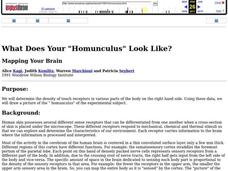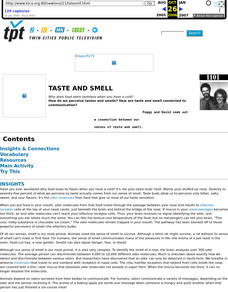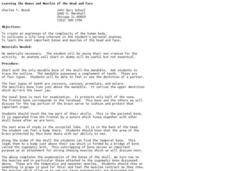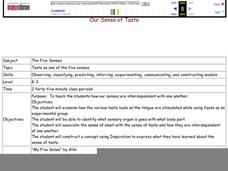Curated OER
What Does Your "Homunculus" Look Like?
Students investigate the density of touch receptors in various parts of the body. They discover how the body senses various stimuli, then maps a picture of the "homunculus" of the experimental subject.
Curated OER
Living Systems Part III
Here is a fantastic, informative, interactive presentation on plant and animal cells. The PowerPoint is produced by an elementary school teacher who has a doctorate in science, and it shows! This would be a splendid presentation to use...
American Museum of Natural History
Express Yourself
Emotions are written all over your face. Pupils match six emotions with full facial expressions in an engaging online interactive. The scholars move on to align the same six emotions with only the expressions from the eyes by dragging...
Curated OER
Primate Evolution
In this primate evolution worksheet, students use a diagram showing different primate adaptations to complete 3 short answer questions comparing human traits and primate traits.
Curated OER
OUtside Influence
Students identify factors that are important for brain functioning of learning. They observe the impact of interaction in mice. They also create their own experiment dealing with the mice. They analyze and share their results.
Curated OER
The Sense of Hearing
High schoolers study the cycle of how we listen and hear our own speech. They examine sound waves, and the role of the nervous system in hearing. They investigate the cues besides lipreading that deaf people rely on for comprehension.
Curated OER
How to Make an Artificial Organ
Young scholars design bionic organs or limbs. In this medical technology lesson plan, students view a video about artificial organs and prosthetic limbs. They research the medical technology behind these advances and work to design a...
Curated OER
Nervous System Introductory Worksheet
In this nervous system instructional activity, students answer thirty short answer questions about the structures and functions of the nervous system and its subsystems.
Curated OER
Autopsy Questions
In this autopsy worksheet learners study how an autopsy is performed then answer a series of questions including how the parts of the body are examined.
Curated OER
TE Activity: Sound Line
Students investigate the decibel readings of various noises. They determine why high-level readings damage hearing. Students arrange sound from the lowest to highest decibel levels when they written on a piece of paper.
Curated OER
21st Century Medicine: Nerves of Steel
Students model a sarcomere's action, they gain a kinesthetic and visual understanding of muscle contraction. They use this exercise stimulates the production of myosin and actin. Students use two colors of clay, make a "sandwich" of...
Curated OER
Body Systems
In this body systems activity, students work in small groups conduct research to become an 'expert' on one of the 7 body systems. Students present their findings to the class via power point, poster, or song.
Curated OER
Body Parts, Systems & Functions
In this body parts worksheet, students match words to definitions, categorize organs into systems, name functions of organs, and more. Students complete 5 activities.
Curated OER
What is the Anatomy of the Visual System?
Students research the structures and functions of the eye. In small groups they dissect a model of the human eye, identify structures of the eye, and describe the functions of the photoreceptors.
Scholastic
Heads Up: Real News About Drugs and Your Body
What's the difference between medical marijuana and marijuana bought on the street? Not much. High schoolers learn more about marijuana with an informational booklet that focuses on the medical uses of THC, how marijuana affects the...
Curated OER
Taste and Smell
Students experiment to determine classmates taste and smell to find out which sends the clearest message to the brain.
Curated OER
Show 303: New Research into Dyslexia
Students explore the causes of dyslexia. They view CT sans and MRIs to view the brain and how it responds. Students read reports about dyslexia. They discuss the nature of dyslexia, its cause, how to diagnose it, and its permanency.
Curated OER
The Nervous System and the Effects of Drugs
In this nervous system worksheet, students read information about how the body receives and sends out information through the peripheral nervous system and central nervous system. Then students complete 3 short answer questions.
Curated OER
Learning the Bones and Muscles of the Head and Face
Young scholars learn about the human body. In this science lesson plan, students discover the bones of the head and face as they explore their own cranium.
Curated OER
Diseases of the Eye
Fifth graders research diseases of the eye. In this science lesson, 5th graders discuss and research eye diseases and complete a worksheet using the information they find.
Curated OER
NASA Robots
Students investigate how robots are used in space. In this space science instructional activity, students participate in an experiment using a blindfold and complete assigned tasks. The students demonstrate how robots are "thinking"...
Curated OER
What Makes Up An Artificial Satellite?
Students discover the components of a satellite using analogies to humans in a class discussion and participate in an activity in which they construct a paper model of a satellites and experiment with different types of attitude control...
Curated OER
Our Sense of Taste
Students explore the relationship between the senses of taste and smell using a blindfold taste test. In partners, they taste different foods with their noses plugged and unplugged. They create a life size outline of the human body to...
Curated OER
How The Ear Receives Sound
In this how the ear receives sound worksheet, students examine and follow a flow chart to view the process of how sound travels within the human ear. Students place the flow chart in chronological order.

























